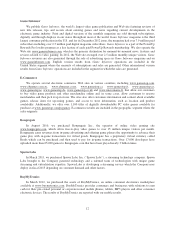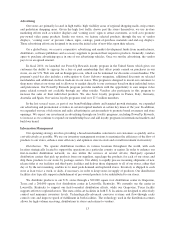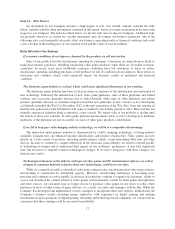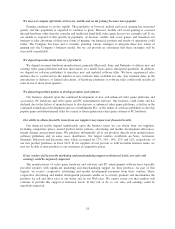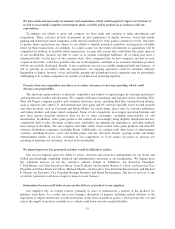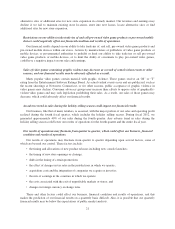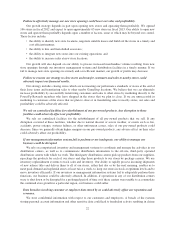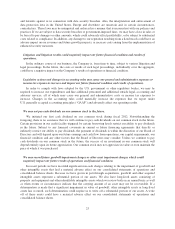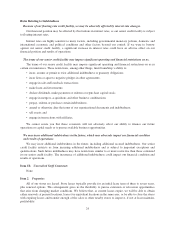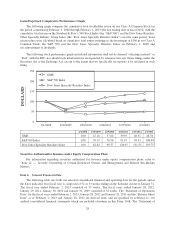GameStop 2012 Annual Report Download - page 34
Download and view the complete annual report
Please find page 34 of the 2012 GameStop annual report below. You can navigate through the pages in the report by either clicking on the pages listed below, or by using the keyword search tool below to find specific information within the annual report.We have made and may make investments and acquisitions which could negatively impact our business if
we fail to successfully complete and integrate them, or if they fail to perform in accordance with our
expectations.
To enhance our efforts to grow and compete, we have made and continue to make investments and
acquisitions. These activities include investments in and acquisitions of digital, browser, social and mobile
gaming and technology-based companies as the delivery methods for video games continue to evolve. Our plans
to pursue future transactions are subject to our ability to identify potential candidates and negotiate favorable
terms for these transactions. Accordingly, we cannot assure you that future investments or acquisitions will be
completed. In addition, to facilitate future transactions, we may take actions that could dilute the equity interests
of our stockholders, increase our debt or cause us to assume contingent liabilities, all of which may have a
detrimental effect on the price of our common stock. Also, companies that we have acquired, and that we may
acquire in the future, could have products that are in development, and there is no assurance that these products
will be successfully developed. Finally, if any acquisitions are not successfully integrated with our business, or
fail to perform in accordance with our expectations, our ongoing operations could be adversely affected.
Integration of digital, browser, social and mobile gaming and technology-based companies may be particularly
challenging to us as these companies are outside of our historical operating expertise.
Pressure from our competitors may force us to reduce our prices or increase spending, which could
decrease our profitability.
The electronic game industry is intensely competitive and subject to rapid changes in consumer preferences
and frequent new product introductions. We compete with mass merchants and regional chains, including Wal-
Mart and Target; computer product and consumer electronics stores, including Best Buy; internet-based retailers
such as Amazon.com; other U.S. and international video game and PC software specialty stores located in malls
and other locations, such as Carrefour and Media Markt; toy retail chains; direct sales by software publishers;
and online retailers and game rental companies. Some of our competitors have longer operating histories and
may have greater financial resources than we do or other advantages, including non-taxability of sold
merchandise. In addition, video game products and content are increasingly being digitally distributed and new
competitors built to take advantage of these new capabilities are entering the marketplace, and other methods
may emerge in the future. We also compete with other sellers of pre-owned video game products and other PC
software distribution companies, including Steam. Additionally, we compete with other forms of entertainment
activities, including browser, social and mobile games, movies, television, theater, sporting events and family
entertainment centers. If we lose customers to our competitors, or if we reduce our prices or increase our
spending to maintain our customers, we may be less profitable.
We depend upon our key personnel and they would be difficult to replace.
Our success depends upon our ability to attract, motivate and retain key management for our stores and
skilled merchandising, marketing, financial and administrative personnel at our headquarters. We depend upon
the continued services of our key executive officers: Daniel A. DeMatteo, our Executive Chairman;
J. Paul Raines, our Chief Executive Officer; Tony D. Bartel, our President; Robert A. Lloyd, our Executive Vice
President and Chief Financial Officer; Michael Mauler, our Executive Vice President-International; and Michael
P. Hogan, our Executive Vice President-Strategic Business and Brand Development. The loss of services of any
of our key personnel could have a negative impact on our business.
International events could delay or prevent the delivery of products to our suppliers.
Our suppliers rely on foreign sources, primarily in Asia, to manufacture a portion of the products we
purchase from them. As a result, any event causing a disruption of imports, including natural disasters or the
imposition of import restrictions or trade restrictions in the form of tariffs or quotas, could increase the cost and
reduce the supply of products available to us, which could lower our sales and profitability.
19





